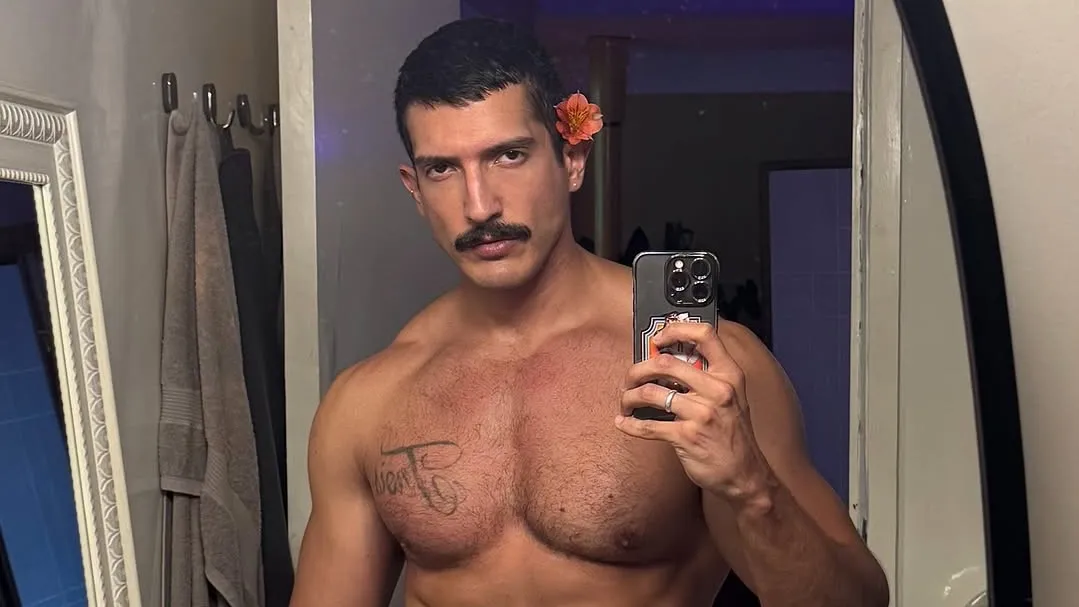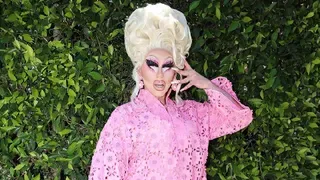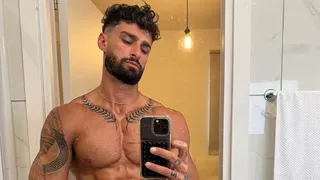November 2, 2013
Through the Ages: Gay on TV
Kilian Melloy READ TIME: 9 MIN.
While no means complete, this list pays homage to some of the more iconic and groundbreaking LGBT characters to have graced the small screen.
The first year that an openly gay character first appeared on the tube is generally credited as 1972. That year saw the premiere of "That Certain Summer," an ABC movie of the week in which Martin Sheen and Hal Holbrook played a gay couple who were attempting to hide their relationship from Holbrook's visiting teenaged son (Scott Jacoby). The film brought in impressive numbers, won awards, and opened doors. (It can now be viewed complete on YouTube.)
Also in '72, ABC aired "The Corner Bar," a short lived, largely forgotten (only 16 episodes) sitcom which featured the late Vincent Schiavelli as Peter Panama, the first ongoing gay character on American television.
Throughout the 1970s, many primetime series featured gay characters in guest starring roles. In 1973, "The Mary Tyler Moore Show" introduced viewers to the gay brother of Phyllis (Cloris Leachman). Around that time, an "All in the Family" episode let us know that "Meathead's" (Rob Reiner) effeminate friend was straight, while Archie's (Carroll O'Connor) macho beer drinking buddy was gay. A few years later, Maude (Bea Arthur), takes homophobic neighbor Arthur (Conrad Bain) to a neighborhood gay bar to show him that gays are just like everyone else.
But these interludes were few and far between. Until Ellen came out in 1997, it was nearly impossible to get a continuing gay character on the tube, though there were exceptions here and there.
Things have improved considerably over the years, though small screen gay characters can still raise eyebrows and incur the wrath of religious conservatives.
Here are a few of the best remembered, and most beloved, groundbreaking LGBT roles to have made it on the air.
Jodie Dallas (Soap)
Played by Billy Crystal
Before "The Golden Girls," writer Susan Harris created the controversial daytime drama spoof "Soap." On the very first episode in September 1977, Jodie's mom (Cathryn Damon) tries to tell him that she thought his being a "homosexual" was a passing phase. But she couldn't say the word, so Jodie would interject the H word into her sentences for her!
Over the course of the show's four year run, Jodie considered having a sex change operation so he could marry his boyfriend (Bob Seagren). Jodie fathered a child, dated a lesbian, and did many other things, which horrified conservatives but kept "Soap" viewers laughing.
For being the first long running gay character on TV, and for never denying who he was, Jodie gets the number 1 spot.
Bianca Montgomery (All My Children)
Played by Eden Riegel, Christina Bennett Lind
Bianca wasn't the first gay character to appear on a daytime drama. Prior to her coming out as a lesbian in 2000, the soaps "One Life to Live," "As the World Turns" and even "AMC" itself featured short-term gay characters. What makes Bianca stand out is her status as the first long running, soap character portrayed by a core contract player.
Bianca is the daughter of Erica Kane (soap superstar Susan Lucci), AMC's long time leading lady. Once she came out, there was no stopping her: Bianca had numerous love affairs, and even kissed her girlfriends on camera. She married one girlfriend, then the two got divorced. A bitter custody battle followed.
In 2006, Bianca had a fling with Zoe (Jeffrey Carlson), a lesbian identified trans-woman. This particularly courageous storyline saw Bianca questioning her sexuality when she feels attracted to Zarf (also Carlson), a David Bowie-ish glam rock star.
Then Zarf comes out and transitions over the course of a six-month story arc.
Bianca broke ground in more ways than one. She was the first soap character whose love and sex lives were as active, and as complicated, as her heterosexual co-stars.
When ABC cancelled "All My Children" in 2011, Bianca was a happily married lesbian mom played by Christina Bennett Lind.
Two years later, the serial was revived by Prospect Park Productions. New episodes were made available on Hulu and iTunes, and were broadcast on OWN. To the delight of millions of fans, Eden Riegel, who played Bianca so brilliantly for a decade, returned to the role, and has just signed on for the revival's second season.
Jack McFarland (Will and Grace)
Played by Sean Hayes
"Will and Grace" premiered on NBC in 1998, the year following Ellen's historic coming out. Ostensibly a sitcom about a gay man and his straight, female best friend (Eric MacKormack, Debra Messing), it was the show's colorful supporting cast that captivated viewers.
As the lovably ditzy, star struck Jack, Sean Hayes stole many scenes. An unapologetically gay, flamboyant queen, Jack was also a genuinely decent, if somewhat irresponsible chap.
Though closeted during the show's production (he has since come out), Hayes played Jack with just the right combination of hysterical theatrics and down home charm.
All gays are not alike, as Jack showed TV viewers for the very first time.
Beverly LaSalle (All in the Family)
Played by Lori Shannon
Norman Lear's brilliantly courageous sitcom "All in the Family" put many of society's prejudices up on a pedestal and ridiculed them. Race, gender roles, religious intolerance, stereotypes of all kinds, nothing was sacred on this hysterically funny if thought provoking series.
One of the more startling, for it's time, Family characters was Beverly LaSalle, a female impersonator who didn't always switch to male attire when offstage.
Brilliantly played by real life drag artist Lori Shannon, Beverly was unlike anyone TV viewers had seen up to that time. Was Beverly transgender? Perhaps.
The third and final of Beverly's "All in the Family" appearances came in 1977, when she was beaten to death on Christmas Eve. Gal pal Edith Bunker (Jean Stapleton) had quite a reaction to the news: She refused to go to Midnight Mass, saying that she couldn't pray to a God that would allow such a thing to happen.
"All in the Family" wasn't always funny, but it always made people think.
Luke and Noah (As the World Turns)
Played by Van Hansis (Luke) and Jake Silbermann (Noah)
A few years after Bianca came out, the traditionally conservative daytime drama "As the World Turns," which hadn't changed much since its 1956 debut, outed young, cute, Luke Snyder. Luke's portrayer, Jake Weary, quit the series immediately, and was replaced by Van Hansis, who was quite comfortable playing a gay role -- Hansis now plays another gay character on the web series Eastsiders.
What made Luke's coming out so significant is the fact that he was the son of Lily and Holden, a supercouple from the show's past. "ATWT"'s primary audience was older and somewhat right wing, and the series was particularly popular in the Midwest.
For many viewers, Luke was their first exposure to an ongoing gay character. Reportedly, a number of Bible Belt grandmas wrote to Hansis, saying that they could now accept their gay grandchildren as a result of watching his portrayal of Luke.
Luke's storylines included dealing with bullying. From 2007-2010, he was involved in a stormy but loving relationship with Noah (Jake Silbermann), and the two are credited as daytime's first gay "supercouple." They became an audience favorite, even after shocking viewers by actually having sex! As "The World Turns"' legendary, 54-year run ended in 2010, Luke and Noah broke up, but parted good friends.
An enterprising "World Turns" fan has archived every scene involving the Luke/Noah love story, where it can still be viewed on YouTube in five-minute segments.
Mrs. Madrigal (Tales of the City)
Played by Olympia Dukakis
Produced by PBS in 1993, "Tales of the City" was a six-episode miniseries based on Armistead Maupin's wildly popular novels about life in 1970s San Francisco.
Oscar winner Olympia Dukakis ("Moonstruck") commanded the screen as Mrs. Madrigal, the gentle, wise, if somewhat mysterious landlady at 28 Barbary Lane, the rooming house she owned. She often served as a den mother to her tenants, who comprised a colorful mix of gay and straight bohemians enjoying the new-found sexual freedoms of the era.
Mrs. Madrigal was harboring quite a secret. 12 years earlier, she had traveled to Europe for sex-reassignment surgery. Unknown to Barbary Lane resident Mona (Chloe Webb), Mrs. Madrigal was her father! Mona was one of two core "Tales" characters who was established as bisexual in this brilliant look at sexuality in a changing world.
Showtime produced two sequels to "Tales of the City." Dukakis returned for both.
Ellen Morgan (Ellen)
played by Ellen Degenres
Thirty-nine million viewers tuned in to hear Ellen say the words "I'm Gay" in 1997. Prior to that historic night, Ellen was a fair to middling sitcom about a neurotic bookstore owner (DeGeneres) who didn't seem to have a sexual identity (though hints were dropped).
Though Ellen was cancelled the following year amid complaints from both religious conservatives and from gays who felt it wasn't really funny, "Ellen," and Degeneres herself, changed the TV landscape forever.
Steven Carrington (Dynasty)
Played by Al Corely and Jack Coleman
On the very first episode of this smash 1980s prime time soap opera hit, Steven Carrington, heir to a vast oil empire, sparred with his dad over his homosexuality.
For the next 8 years, Steven fell in love with a variety of men, and even married evil Sammi Jo (Heather Locklear), with whom he fathered a child.
Al Corely played Steven for two years, then quit amid complaints that Steven's ever-changing sexual preferences made no sense. Jack Coleman then saw the character through a variety of male and female relationships for the remainder of the show's run. Corley returned for a 1991 reunion movie.
"Dynasty" proved to be quite popular with gay audiences, in part due to Steven, but also due to the arrival, in season two, of the outrageous Alexis Carrington Colby (Joan Collins), a scheming, over the top, drag-queenish madwoman who brought a camp sensibility to the series.
Steven's fluid sexuality really isn't all that hard to explain: He was prime time television's first ongoing bi-guy!
Mitch and Cameron (Modern Family)
Played by Jesse Tyler Ferguson (Mitch) and Eric Stonestreet (Cameron)
When TV Guide named Mitch and Cameron, the gay couple from ABC's brilliant comedy drama "Modern Family," as among the five best TV Dads, we knew we were an accepted part of the mainstream. Together for 8 years, the guys adopted Lily, a young girl from Vietnam.
Neither of the guys is a "hunk." What they are is real: neurotic and insecure, they're full of love for each other and for their daughter in this, perhaps TV's most realistic peek inside the day to day lives of a gay family (and other families).
Brian Kinney (Queer as Folk)
Played by Gale Harold
Drop dead gorgeous, buff, promiscuous and always horny, Brian Kinney was the most popular character on Showtime's breakout gay soap opera "Queer as Folk."
Brian knew how hot he was. Wealthy and above it all, he viewed other gay men as objects to be used for sex, then discarded.
But when 17 year old Justin (Randy Harrison) fell in love with him, Brian found his soul mate.
Over the course of "Queer as Folk"'s five seasons, viewers joined Brian on his voyage of discovery, as he slowly became the decent, loving person he truly was. Gale Harold played the changes in Brian slowly, brilliantly revealing the man beneath the mannequin. Brian is one of the most complex and multi-layered gay characters ever to appear on television, and Harold proved himself to be more than up to the acting challenge.
Julia Hoffman (Dark Shadows)
Played by Grayson Hall
In 1964, character actress Hall received a well-deserved Oscar nomination for her portrayal of Miss Fellows, a frustrated lesbian spinster, in the film "The Night of the Iguana." It was the first Academy nomination in history for an actor in a gay role.
In 1967, Hall was cast as the brilliant if slightly mad Dr. Julia Hoffman on "Dark Shadows," the spooky supernatural soap opera. Doc Julia soon fell in love with her patient, the 175-year-old vampire Barnabas Collins (Jonathan Frid).
In 1970, Hall played Julia's counterpart in a parallel universe story. Parallel Time Julia was a servant, helping her beloved Mistress Angelique (Lara Parker) pass herself off as Angelique's twin Alexis: Angelique had come back from the dead and murdered Alexis.
Though the L word was never uttered, it became clear as the storyline progressed that Julia was head over heels in love with her employer: The puppy dog love in Hoffman's eyes was a dead giveaway!
Parallel Time Julia was based on Mrs. Danvers (Dame Judith Anderson) from the classic Daphne DuMaurier novel "Rebecca," filmed by Alfred Hitchcock in 1940.
Danvers' lesbianism was plain to see in the film, and Hall, on "Dark Shadows," channeled Anderson's performance when she declared her love for Angelique.
Certainly a daring thing to do on daytime TV in 1970!
Beverly Leslie (Will and Grace)
Played by Leslie Jordan
Gay Republicans got a delightful, well deserved ribbing with openly gay Jordan's hysterical portrayal of wealthy, deeply closeted Southern Belle Beverly, "the world's oldest girl," as he was called by arch-enemy Karen (Megan Mullaly).
The friendly enemies sparred hilariously as Beverly, determined to keep his sexuality a secret (in spite of the fact that he was a flaming, effeminate queen!), fends off Karen's many ingenious attempts to out him.
As stated earlier, W & G's supporting cast was far more colorful than the leads!
The Glee Kids
No show has better illustrated how far we've come then "Glee." Sure, we love the fabulous musical numbers, but "Glee" is so much more.
The series is set in that perfect world where gays, straights, bisexuals, lesbians and transgender people co-exist side by side, accepting each other at face value and without judgment.
"Glee" is a magnificent example of how much the TV landscape has changed since ABC aired "That Certain Summer" 41 years ago.
Kilian Melloy serves as EDGE Media Network's Associate Arts Editor and Staff Contributor. His professional memberships include the National Lesbian & Gay Journalists Association, the Boston Online Film Critics Association, The Gay and Lesbian Entertainment Critics Association, and the Boston Theater Critics Association's Elliot Norton Awards Committee.





